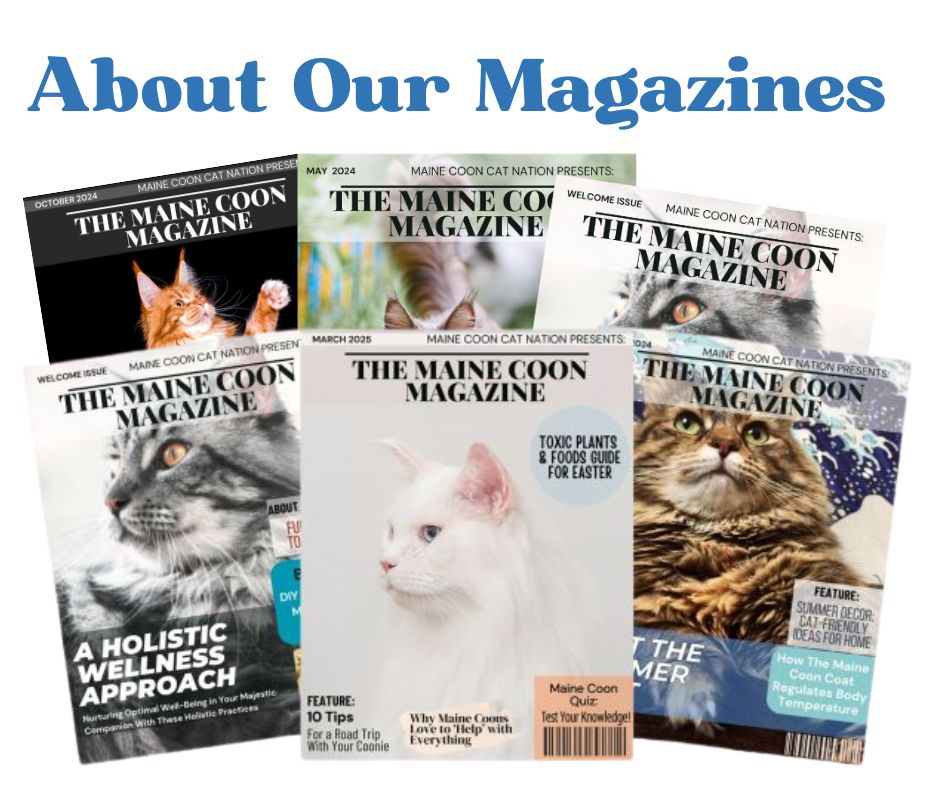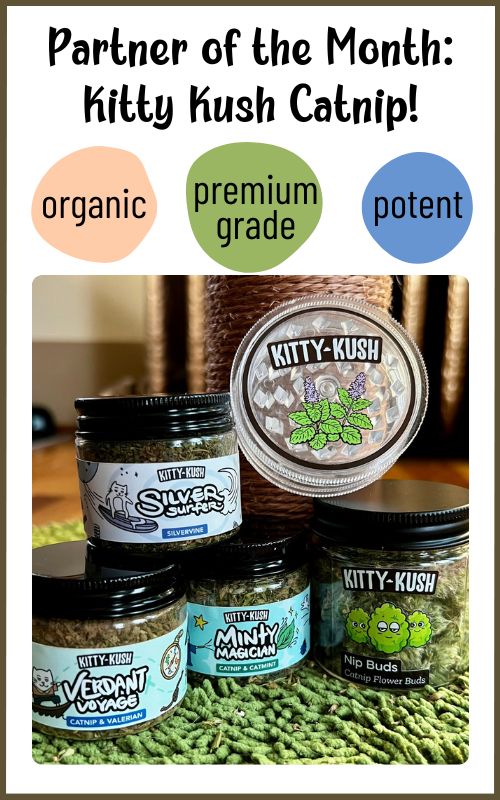- Home
- Maine Coon Cat Health
- Why Do Kittens Get Diarrhea?
Why Do Kittens Get Diarrhea?
8 Top Reasons & How To Help
Why do kittens get diarrhea? When we first brought home our Maine Coon kittens, we set them up in a separate room with all their bedding, food and water, and litter boxes. They settled in nicely!
I soon found out that diarrhea in kittens certainly happens.
They were perfect in their use of the litter box, fully trained, but it was still a mess.
Let's just say that Alice and Leo had a lot of baths in the beginnning!
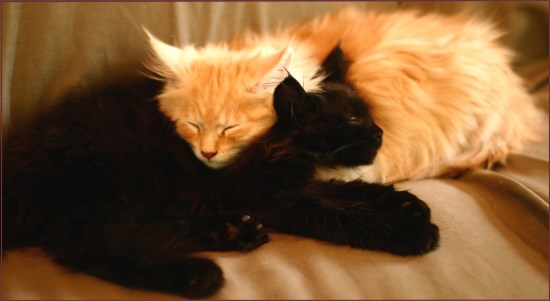
How Common Is Kitten Diarrhea?
Welcoming a new kitten into your home is such an exciting time, and if you are worried about their health, that can really put a damper on things.
Loose stools are worrying, but it helps to know that it's also quite common.
I was worried about the causes of diarrhea in my new kittens, and I immediately called our family veterinarian. He quickly put my mind at ease.
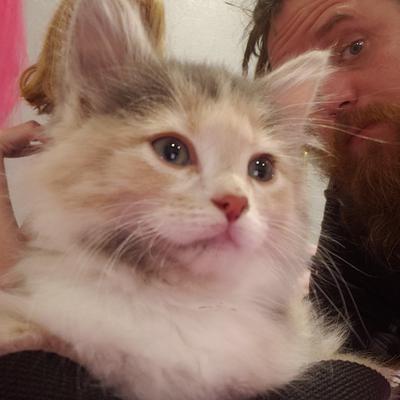
As it turns out, diarrhea in kittens is not uncommon.
It can happen for a variety of reasons, especially when they first come home.
It can be caused by a variety of factors, from dietary changes to stress from a new home.
Some bouts of diarrhea are mild and resolve quickly, while others may require veterinary attention. Let's break it down:
What Is Cat Diarrhea?
Simply put, cat diarrhea involves frequent, loose, or watery stools. When kitty's digestive system is upset, it results in soft stools that can vary in color and consistency.
As a cat parent, whey you see this, you know that your new baby is either feeling unwell, or under stress.
Normal vs. Abnormal Stool Consistency

When it comes to your kitten's stool, it's helpful to know what's normal and what's not.
Healthy stools are usually firm and well-formed.
Soft stools or those with an unusual color or odor can signal a problem.
If things don't look right, it might be time to consult your vet.
8 Common Causes of Kitten Diarrhea
1. Dietary Changes
Why do kittens get diarrhea? One of the most common causes is a sudden change in diet.
Switching to a new food can upset their delicate digestive system. It's important to introduce new food gradually to avoid tummy troubles.
Whether it’s a shift to a different brand or type of food, a slow transition helps their stomachs adjust.
2. Food Allergies or Intolerances
Just like humans, some kittens can have food allergies or intolerances.
Certain ingredients might not agree with your kitty’s system, leading to soft stools or other signs of illness.
If you notice a pattern after feeding specific foods, it might be time to consult your vet about possible food allergies.
3. Parasites
Intestinal parasites, such as worms and Giardia, are another culprit behind kitten diarrhea. These pesky invaders can cause significant digestive upset. [1]
Regular deworming and vet check-ups can help keep these internal parasites at bay and ensure your feline friend stays healthy.
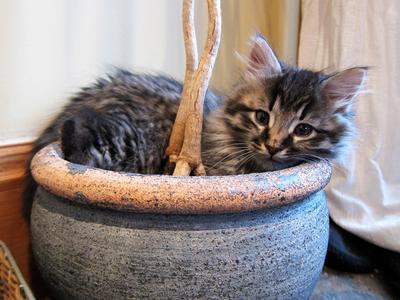
4. Bacterial or Viral Infections
Infections, whether bacterial infections or viral infections, can wreak havoc on a young kitten's digestive system.
Common bacterial infections include Salmonella and Campylobacter, while viral infections like feline immunodeficiency virus (FIV) and feline leukemia virus (FeLV) can also cause diarrhea.
If your kitty is showing signs of illness, such as lethargy or loss of appetite, it’s essential to seek veterinary care.
5. Stress and Environmental Changes
Moving to a new home or experiencing significant changes in their environment can be stressful for kittens.
This stress can manifest as diarrhea. The anxiety of adjusting to new surroundings, meeting new people or pets, and other changes can upset their digestive system.
It's likely that your kitten’s upset stomach is related to these environmental changes rather than an underlying health issue.
6. Overeating or Sudden Diet Changes
Kittens have a tendency to overeat, especially when they find food they like.
This dietary indiscretion can lead to diarrhea. Additionally, sudden diet changes can shock their system.
Feeding your kitty smaller, more frequent meals can help avoid these problems.
7. Ingestion of Foreign Objects or Toxins
Kittens are curious creatures and often chew on things they shouldn't. Ingesting foreign objects or toxic or hazardous items can cause digestive upset.
Keep an eye on what your kitty is getting into and kitten-proof your home to prevent accidental ingestion of harmful items.
8. Underlying Health Conditions
Although less common, some kittens may have underlying health conditions that contribute to diarrhea.
Conditions such as inflammatory bowel disease (IBD) or other chronic illnesses can cause persistent digestive issues.
If dietary changes and stress management don’t seem to help, it's worth discussing these possibilities with your vet.
In most cases, your kitty’s diarrhea is likely due to more benign factors like stress from a new home or a sudden diet change.
Keeping their environment calm and stable, along with a gradual approach to food transitions, will go a long way in helping them feel better.
When to Call the Vet
Signs That Indicate a Serious Issue
It's natural to worry when your young kitten has GI upset, but how do you know when it's time to call the vet?
Look out for signs of severe diarrhea, such as blood in the stool, persistent vomiting, lethargy, and dehydration.
Honestly, you should never hesitate to call your vet with any question or concern.
Very often, they will consult with you over the phone, perhaps giving you a call back. They will let you know what you can do at home and when to make the decision to come in. They may suggest a supplement or home remedy over the phone.

Duration of Diarrhea and When to Worry
While mild cases of diarrhea can resolve on their own, if loose stools last more than a couple of days, it's time to consult your vet.
Chronic diarrhea can lead to dehydration and other health complications, so keeping an eye on the duration is essential.
Symptoms Accompanying Diarrhea
In addition to loose stools, other symptoms like vomiting, lethargy, and significant weight loss should prompt a vet visit.
These can indicate more severe underlying issues and require a professional to evaluate your kitten's overall health.
Age and Health Status Considerations
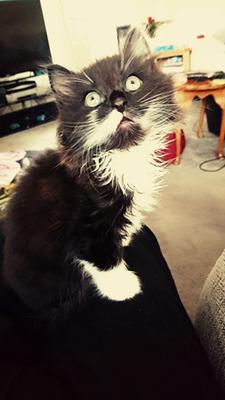
Young kittens and those with existing health conditions are more vulnerable to complications.
If your kitty falls into these categories, err on the side of caution and seek veterinary advice sooner rather than later.
An accurate diagnosis of your pet’s condition is crucial for effective treatment.
Professional Diagnosis and Treatment
A vet can perform tests, such as blood work, to determine the cause of your kitten's GI upset. He or she may request a stool sample.
Depending on the diagnosis, your vet might prescribe anti-diarrheal medications, probiotics, or other treatments to help your feline friend recover.
In some cases, dietary changes or specific treatments for underlying conditions might be necessary.
Professional guidance ensures your kitty gets the right care and avoids potential complications.
If you're ever unsure why your kitten gets diarrhea or if it seems more severe than usual, it's best to seek professional advice.
Your vet can provide the care and possible treatments your kitty needs to get back to feeling their best.
In my case, a call to my veterinarian was all that was needed. They prescribed an over the counter remedy, and checked back in over the phone. All was well!
At-Home Treatments and Care
Dietary Adjustments
When your young kitty is dealing with GI upset, making some dietary adjustments can be a good idea.
Offering a bland or limited-ingredient diet can help soothe their tummy. If you’re changing their food, do it gradually over several days to avoid further upsetting their stomach.
Transitioning slowly between kitten milk replacer and solid food or between different brands of wet food can also help.
Hydration and Electrolyte Balance
Keeping your feline friend hydrated is essential, especially if they're experiencing loose stools.
Make sure they have access to fresh water at all times. In some cases, you might need to offer an electrolyte solution designed for pets to help maintain their hydration levels.
If your kitty isn't drinking enough, consult your vet for additional advice.
Probiotics and Supplements
Adding probiotics to your kitty's diet can help restore the balance of good bacteria in their gut.
These supplements can support their digestive health and aid in recovery.
Consult your vet for recommendations on the best probiotics and other supplements for your kitten's specific needs.
Importance of Cleanliness and Hygiene
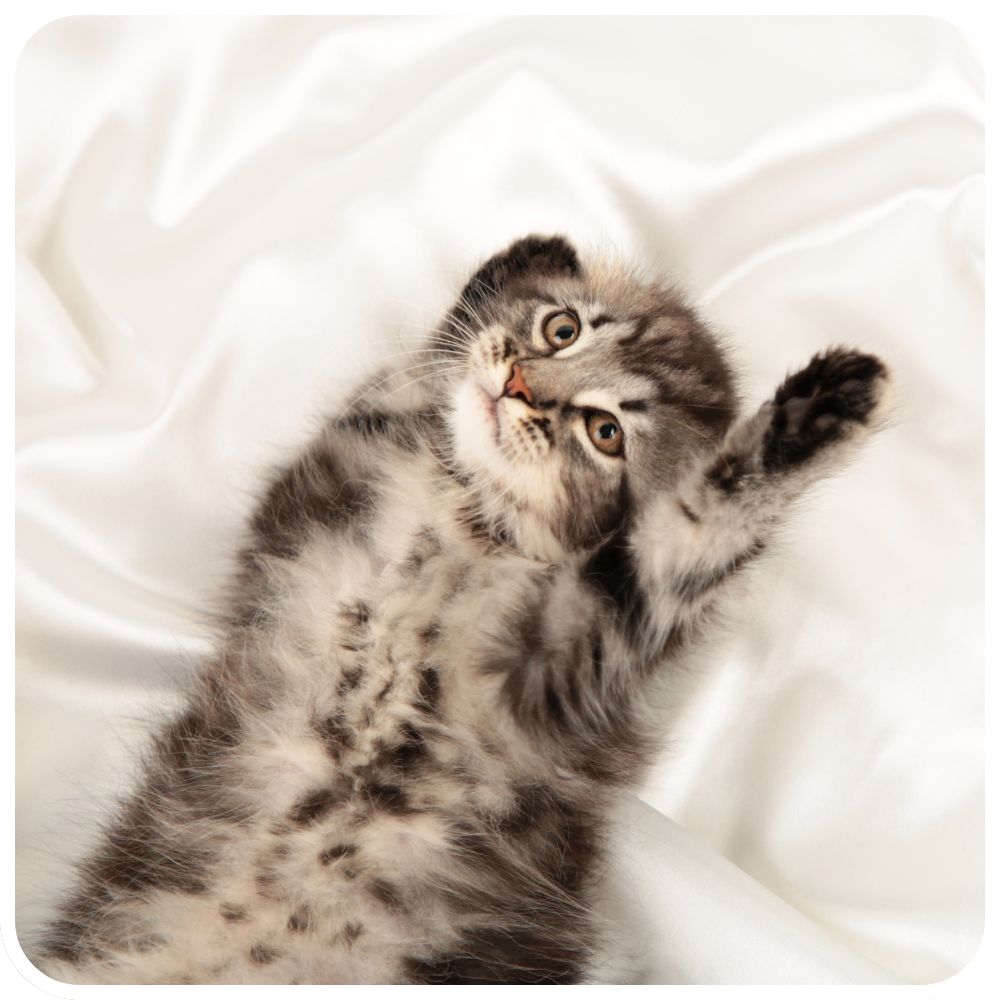
Maintaining a clean environment is vital when your kitten is dealing with GI issues.
Clean their litter box frequently to prevent the spread of bacteria and parasites.
Regularly wash their food and water bowls, and keep their living area tidy to minimize stress and promote good health.
Monitoring and Recording Symptoms
Keeping track of your kitten’s symptoms can provide valuable information for both you and your vet.
Note any changes in their stool consistency, appetite, behavior, and overall health.
Monitoring their progress helps you determine if the at-home treatments are working or if it’s time to seek veterinary advice.
With the right dietary adjustments, proper hydration, and attention to cleanliness, you'll help your kitty get back to their playful, happy self in no time!
Preventing Kitten Diarrhea
Proper Diet and Nutrition
A balanced diet is key to keeping your young kitty healthy. Stick to high-quality kitten food that's specifically formulated for their nutritional needs.
Avoid giving them dairy products or human food, as these can upset their digestive tract. A well-fed kitty is less likely to have issues with their GI tract.
Gradual Transitions Between Foods
If you need to change your feline friend's diet, do it slowly. Gradual transitions between foods help their digestive system adjust without causing GI upset.
Start by mixing a small amount of the new food with their current food, gradually increasing the new food over a week or more.
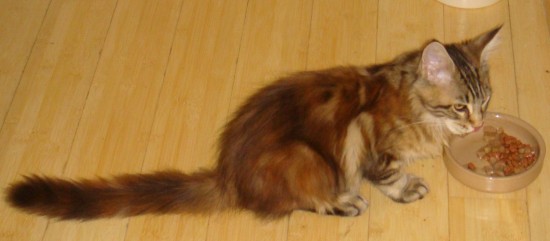
Regular Vet Check-Ups and Vaccinations
Regular vet visits are a must for keeping your kitten in tip-top shape. Routine check-ups can catch potential issues early and keep your kitty up-to-date on vaccinations.
These preventative measures are essential in addressing why kittens get diarrhea and other health concerns before they become serious.
Parasite Prevention and Treatment
Intestinal parasites are a common cause of digestive issues in young kittens.
Regular deworming and preventative treatments can help keep these pests at bay.
Your vet can recommend the best parasite prevention plan for your furry friend.
Stress Reduction Techniques
Stress can wreak havoc on a kitty's digestive tract. To minimize stress, create a calm and stable environment for your new pet.
Gradually introduce them to new people, pets, and environments to help them feel secure.
Providing plenty of playtime and affection can also reduce stress levels and promote a healthy digestive system.
Proper nutrition, gradual food transitions, regular vet care, parasite prevention, and stress reduction, are all key to keeping your kitten's digestive system healthy - and preventing bouts of GI upset.
Why Do Kittens Get Diarrhea? FAQs:
Is kitten diarrhea an emergency?
Is kitten diarrhea an emergency?
It depends. Mild cases usually aren't emergencies, but if your feline friend has persistent loose stools, especially with symptoms like vomiting, lethargy, or blood in the stool, it's time to see the vet.
These could be signs of a more serious issue.
Can human medications be used for kitten diarrhea?
Can human medications be used for kitten diarrhea?
No, never give your kitty human medications without consulting a vet. Many human drugs can be harmful or even fatal to felines.
Your vet can recommend safe and effective treatments specifically designed for pets.
How long does kitten diarrhea usually last?
How long does kitten diarrhea usually last?
In many cases, mild GI upset resolves within a couple of days. If your kitty's symptoms persist longer than this, it’s important to seek veterinary advice. Prolonged issues could indicate a deeper problem that needs attention.
Can kittens develop chronic diarrhea?
Can kittens develop chronic diarrhea?
Yes, young cats can develop chronic issues, often due to underlying conditions like food intolerances, inflammatory bowel disease, or persistent infections.
If your furry friend experiences ongoing digestive troubles, a vet visit is necessary for proper diagnosis and treatment.
What are the risks of untreated diarrhea?
What are the risks of untreated diarrhea?
Untreated digestive issues can lead to dehydration, weight loss, and nutrient deficiencies, which can be particularly dangerous for young kittens.
It’s important to address the issue promptly to avoid these risks and help your kitty get back to their playful self.
If you’re ever in doubt, a quick call to your vet can provide peace of mind and the right care for your kitty.
Recap:
Why do kittens get diarrhea? The most common causes include:
- Dietary changes
- Stress
- Parasites
- Infections
While mild cases often resolve quickly, persistent or severe symptoms require veterinary attention.
Gradual food transitions, maintaining hydration, and keeping a clean environment are vital steps in managing and preventing digestive issues.
Seek Veterinary Advice When in Doubt
Don't hesitate to seek veterinary advice. Your vet can provide accurate diagnoses and appropriate treatments to ensure your kitten's health.
If you’re ever unsure why your new baby is experiencing digestive troubles, a quick call to your vet can make all the difference. Your kitty deserves the best care, and professional guidance is always a wise choice.
Top of Why Do Kittens Get Diarrhea?
« Back to Maine Coon Health
Disclaimer
Please remember that the information provided in this article is intended for informational purposes only and should not be considered as veterinary advice. While we strive to provide accurate and up-to-date information, every cat is unique, and individual health conditions may vary. Always consult with a qualified veterinarian for professional medical advice, diagnosis, and treatment specific to your cat's health and well-being.
[1] Reference: Diarrhea in kittens and Young cats - WSAVA2011 - VIN. (n.d.). https://www.vin.com/apputil/content/defaultadv1.aspx?pId=11343&catId=34567&id=5124223
Recent Articles
-
Today's Features
Apr 16, 25 09:54 PM
Today we have two classic Memory Lane pages to share!
Murphy & Candy Cane: Double the Maine Coon Charm - This adorable Maine Coon duo from our 2011 Photo Albums - Murphy and Candy Cane - brought doubl… -
Memory Lane Month Begins!
Apr 15, 25 10:22 PM
We're thrilled to start our "Memory Lane Month" event by visiting some cherished moments from our community! We're in the process of restoring meaningful community stories like this one, to preserve t… -
Will a Maine Coon Protect Its Owner From Danger or an Intruder?
Apr 09, 25 10:41 PM
Plenty of people are curious: Will a Maine Coon protect its owner if something happens? Let’s talk about what this means, and what kind of protector a Coonie is.
